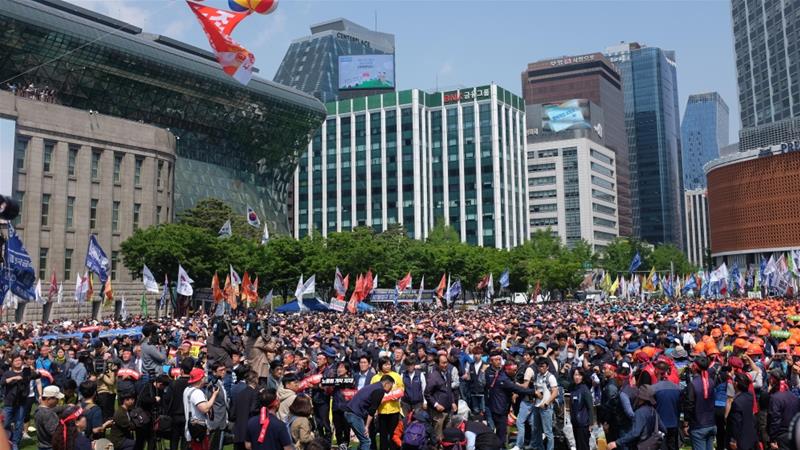Thousands of South Korean workers have marked Labor Day with a rally in central Seoul, urging the government to adopt major international regulations on promoting labour rights.
Organisers told Al Jazeera that around 27,000 people turned up at Seoul Plaza while another 57,000 demonstrated in 13 cities across the country on Wednesday.
Commemorating International Workers’ Day simultaneously, the Korean Confederation of Trade Unions (KTCU), an umbrella labour union and organisers of the rally, said it was urgent for the country to ratify key conventions of the International Labor Organization (ILO).
Wearing headbands and swinging fists, the protesters in Seoul rallied in streets near City Hall, marching under banners denouncing deteriorating working conditions and equal treatment and pay for non-regular workers.
“The history of unconstitutional labour law, which is unfair to the workers, should stop as soon as possible. We will fight until we achieve the absolute basic labour rights,” KTCU chairman Kim Myung Hwan told Al Jazeera.
The KTCU also called for the job security of irregular workers, a 10,000 won ($8.57) minimum hourly wage, reform of family-owned conglomerates and the expansion of a social safety net.
South Korea became a member of the ILO in 1991. It has since ratified more than two dozen ILO conventions, including four of the eight core ones: two on discrimination and two others on child labour.
Liberal President Moon Jae-in, who won office in May 2017, pushed a labour-friendly agenda that promised to expand workers’ rights, reduce the country’s notoriously long working hours and address the problems of inequality by elevating minimum wages.
“I’ve worked as a cleaner in a subway station for five years. President Moon promised to make all irregular workers become regular but he hasn’t done that yet,” said Jun Sang Mun, 55.
“So I’ve come out today to remind him of that promise.”
President Moon’s labour-friendly agenda also included reining in the excesses of chaebol, or huge family-owned conglomerates that dominate South Korea’s economy and are often accused of corruption and monopolistic behaviors.
On Wednesday, the protesters also called for the government to take firmer steps towards reforming it.
Jung Yeon Kuk, 61, came from Gyung Gi Do to Seoul for the rally. As a carpenter who is not a regular worker, he complained he would not get holiday pay or a paid weekend because of the current labour law.
“I’ve worked as a construction carpenter for more than 20 years,” he said.
“Other regular construction managers don’t work on Sundays but get paid. I don’t. And that’s not fair. There are more than 20,000 irregular construction workers in Gyung Gi Do where I am from who are treated unfairly like me.”
In a statement released on Wednesday, the president said he wanted “to create a country where labor is proudly held up”.
“I want to build a nation where people can realise their dreams through labor, where people can contribute to global development through labor and where people can be respect through labor,” said President Moon.
The local labour circles have long demanded that the government ratify the remaining ILO core conventions, which include those on the abolition of forced labour, and the right to organise and collective bargaining.
Critics say a decaying job market and bad economy, which unexpectedly shrank 0.3 percent during the last quarter due to sluggish investment, has softened the government’s approach on labour rights and corporate reform.
“I’ve worked on the production line for 10 years,” said 50-year-old Ko Mun Kyug.
“Luckily, I’m a regular worker but I’m here for the other workers who deserve the same payment and same treatment that I get. That is the meaning of labour day all over the world. I want to share the spirit of the day with all of my co-workers.
“It is shameful that South Korea is still far from ratifying the ILO core convention. What a shame. I wish the current government do more to make an agreement between the employers.”
South Korean workers are known for their vibrant protest culture, which contributed to the popular uprising that drove the country’s transition from an anti-communist military dictatorship to a Western-style democracy in the late 1980s.
“What make all these people come here while sacrificing their holiday?” asked 49-year-old Cho Me Yeon.
“That is what the government and policymakers should think about today while watching us shouting and marching for labour rights in the country.”






